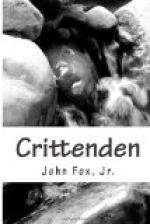Crittenden glanced covertly at Judith’s face. A mood in her like this always made him uneasy.
“Not in the usual way; I don’t think it’s usual. I hope not.”
“How, then?”
“Oh, pride, absence—deterioration and other things.”
“Why, then?”
Judith’s head was leaning backward, her eyes were closed, but her face seemed perfectly serious.
“You told me to get over it.”
“Did I?”
Crittenden did not deign to answer this, and Judith was silent a long while. Then her eyes opened; but they were looking backward again, and she might have been talking to herself.
“I’m wondering,” she said, “whether any woman ever really meant that when she said it to a man whom she—” Crittenden turned quickly—“whom she liked,” added Judith as though she had not seen his movement. “She may think it her duty to say it; she may say it because it is her duty; but in her heart, I suppose, she wants him to keep on loving her just the same—if she likes him—” Judith paused—“even more than a very little. That’s very selfish, but I’m afraid it’s true.”
And Judith sighed helplessly.
“I think you made it little enough that time,” laughed Crittenden. “Are you still afraid of giving me too much hope?”
“I am afraid of nothing—now.”
“Thank you. You were ever too much concerned about me.”
“I was. Other men may have found the fires of my conscience smouldering sometimes, but they were always ablaze whenever you came near. I liked you better than the rest—better than all——”
Crittenden’s heart gave a faint throb and he finished the sentence for her.
“But one.”
“But one.”
And that one had been unworthy, and Judith had sent him adrift. She had always been frank with Crittenden. That much he knew and no more—not even the man’s name; but how he had wondered who and where and what manner of man he was! And how he had longed to see him!
They were passing over a little bridge in a hollow where a cool current of air struck them and the freshened odour of moistening green things in the creek-bed—the first breath of the night that was still below the cloudy horizon.
“Deterioration,” said Judith, almost sharply. “What did you mean by that?”
Crittenden hesitated, and she added:
“Go on; we are no longer children.”
“Oh, it was nothing, or everything, just as you look at it. I made a discovery soon after you went away. I found that when I fell short of the standard you”—Crittenden spoke slowly—“had set for me, I got at least mental relief. I couldn’t think of you until—until I had recovered myself again.”
“So you——”
“I used the discovery.”
“That was weak.”
“It was deliberate.”
“Then it was criminal.”
“Both, if you wish; but credit me with at least the strength to confess and the grace to be ashamed. But I’m beginning all over again now—by myself.”




